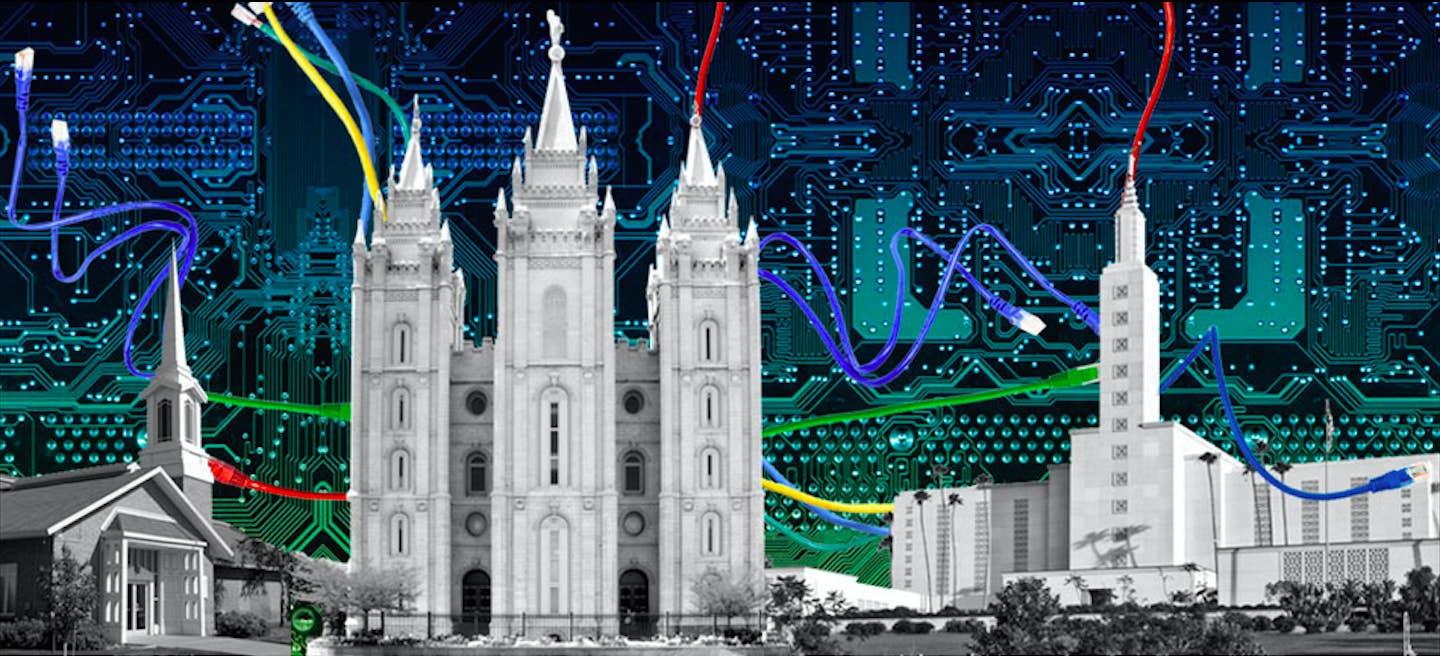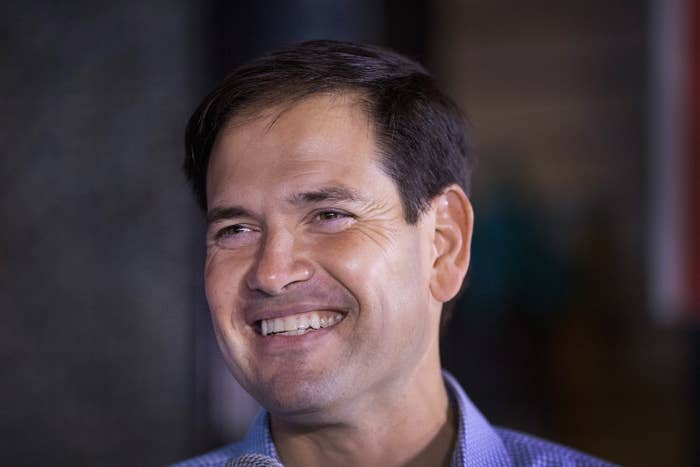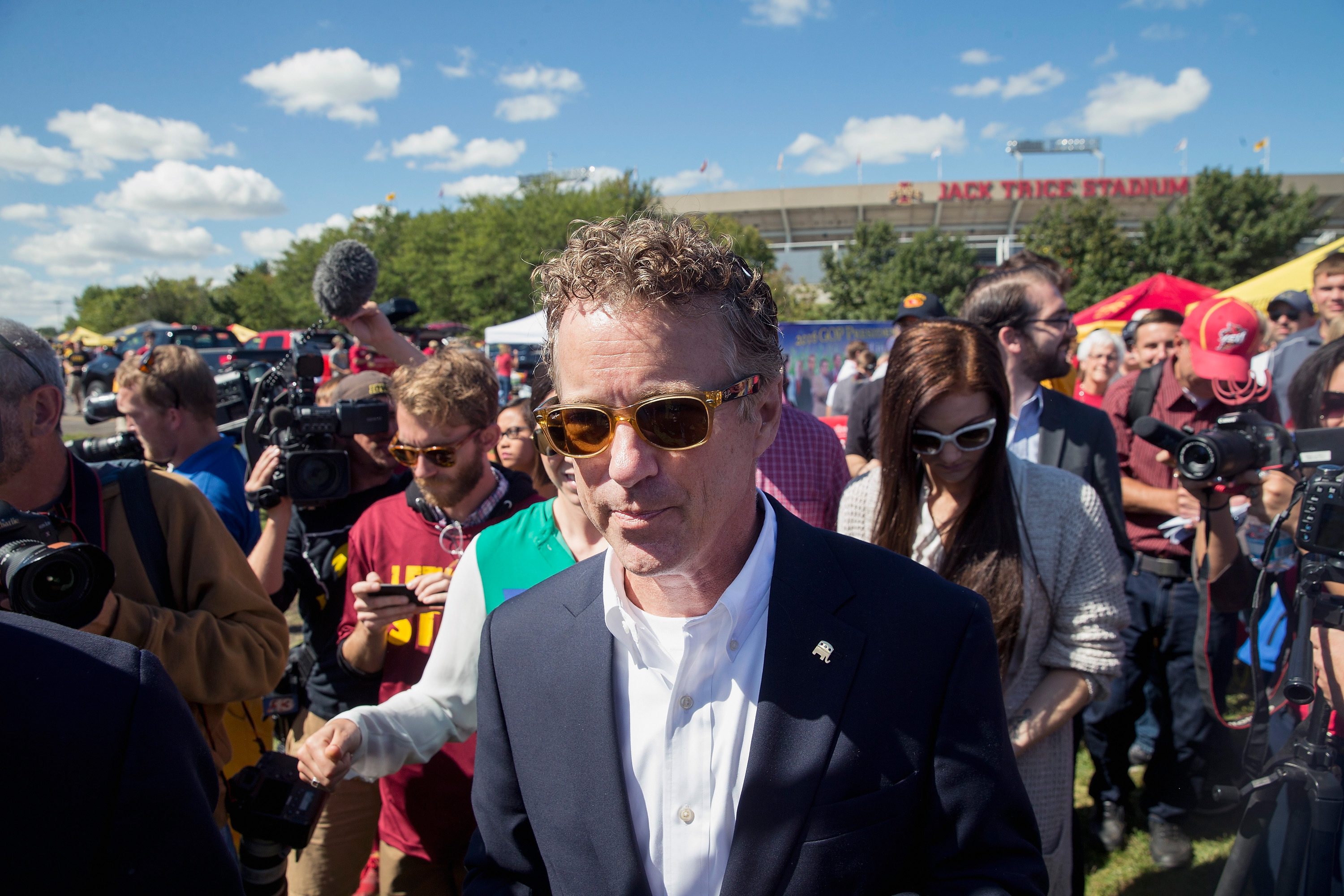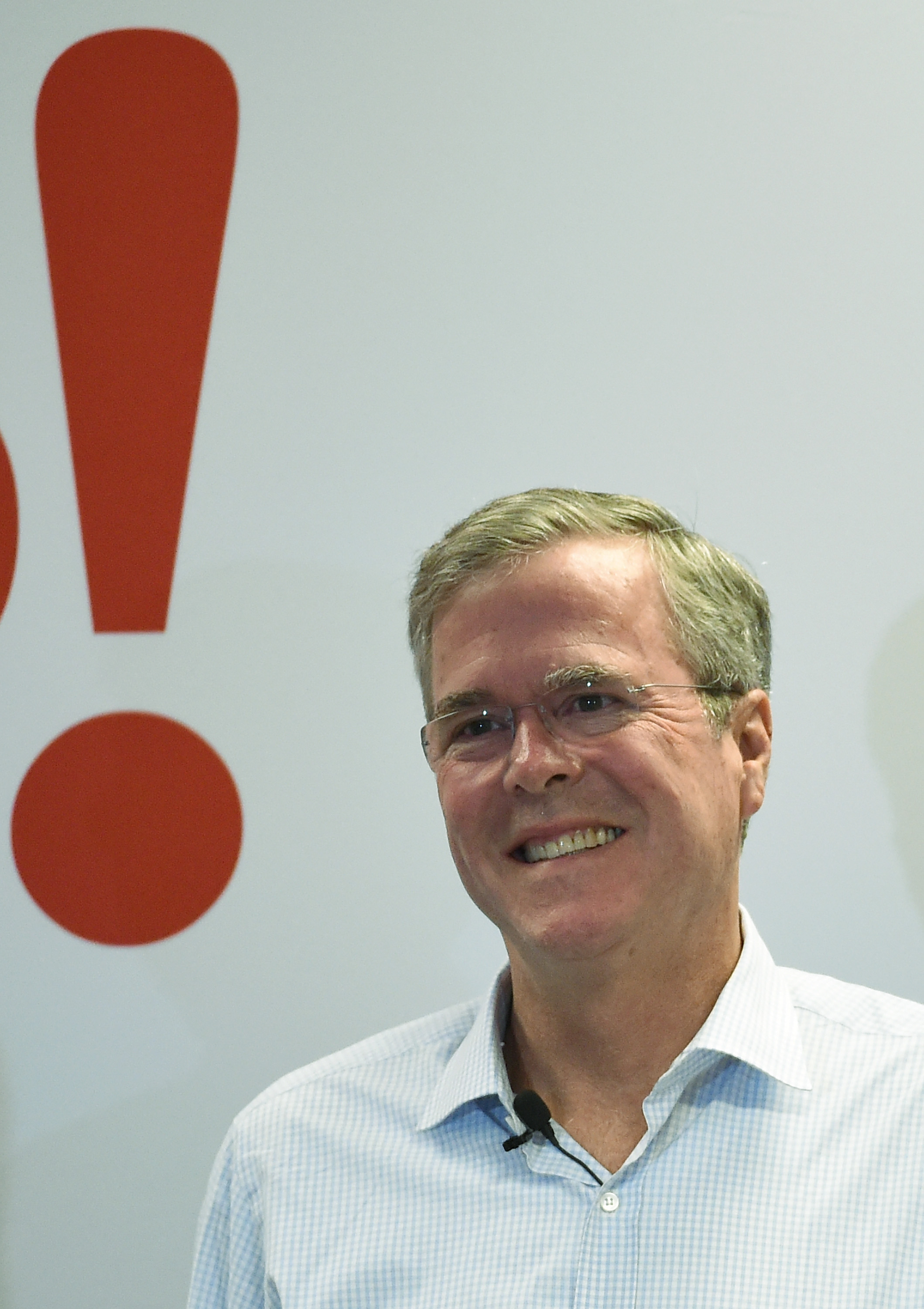
LAS VEGAS — Rand Paul has quoted Mormon scripture in an op-ed. Jeb Bush has surrounded himself with Mormon surrogates and fundraisers. And Marco Rubio's backers are touting the candidate's childhood in the church to claim he could be "the first Mormon president."
Four years after Mitt Romney dominated Nevada's crucial presidential caucuses by marshaling an army of right-leaning Latter-day Saints, top 2016 Republican candidates are quietly but aggressively courting the state's Mormon vote — and many believe the small religious constituency will not only decide the winner in Nevada, but reshape the national race at a pivotal moment in next year's primaries.
"Whatever campaign is able to successfully organize and turn [Mormons] out for their candidate in this cycle will win Nevada," said Todd Cranney, a Mormon who served as deputy political director for Romney's 2012 campaign. "I do believe some of the campaigns recognize this fact, and are working hard to turn out LDS voters. That's a very smart strategy."
Mormon voters are not generally accustomed to wielding much political clout in national elections. Though polls suggest the overwhelmingly Republican members of the Church of Jesus Christ of Latter-day Saints are more politically engaged than most voters, they still represent a relatively tiny portion of the American electorate, and are most heavily concentrated in deep-red Western states like Utah and Idaho — far away from election-year battlegrounds. Even as their religion was endlessly dissected and debated in the political sphere during Romney’s two campaigns, rank-and-file Mormon voters have never before had the sort of influence that leads presidential candidates to genuflect before them. Until now.
GOP strategists attribute this change to the Romney campaign’s unprecedented success in organizing and energizing the state’s LDS voters. While Nevada is only about 5% Mormon, members of the church made up a whopping 25% of the Republican caucuses in both 2008 and 2012.
At the time, pundits chalked up the disproportionate turnout to tribal enthusiasm for the prospect of a Mormon president. But the surge of LDS voters was also the product of a much more sophisticated effort on the part of the Romney campaign, according to several former staffers. "Obviously Mitt was very attractive to [Mormons] for lots of reasons," said one former Romney adviser, "but the methodology of how Mitt went about going after them, it wasn't scattershot. It was very systematic; it was very organized." It was also, by necessity, largely under the radar.
The strategy began with understanding the Mormon church's unique organizational infrastructure. Unlike most religious sects, the church is structured like a top-down corporation, and every congregation in the world reports back to headquarters in Salt Lake City. Mormons are each assigned to a geographically determined "ward" of about 200–300 people, and each congregation distributes a directory of its members' addresses and contact information, to be used for coordinating visits to needy families, or organizing church picnics. Members are expressly prohibited from using the lists for political or business purposes, and while there were isolated rumors of abuse in 2012 by overzealous partisans, Romney himself was adamant that his team not violate the church's rule.
Instead, between 2008 and 2012, Romney's operatives in Nevada methodically, and discreetly, built their own vast database of Mormon Republicans in the state — simply by asking every donor and volunteer they encountered to share their contact lists with the campaign. This is common practice in politics, and often people respond by sending along their Gmail groups or Outlook lists. For Mormons, those lists typically included their ward directories — and Romney's team became skilled at quickly sorting out the LDS contacts from the others by scanning for hints like an individual's church assignment or title listed by their name. To fill in the gaps, they rounded up contact information from other Mormon-heavy organizations, like local Boy Scout groups.
"Our approach to the LDS vote was the same as any other coalition," said a Romney adviser. "You organize the way they're organized."
The difference is that, unlike other politically influential religious groups such as evangelical homeschoolers in Iowa, Nevada's tightly networked Mormon community didn't have the same established network of longtime political activists and appointed power brokers. Romney was, to a large degree, building it from the ground up.
By the end of 2012, one former campaign aide boasted, he had accumulated the contact information for "a very large percentage" of Nevada's LDS population.
"There's no other coalition in Nevada that comes even close — not even libertarians," said a former Romney campaign strategist. "I don't care what anyone says. In terms of organization, engagement, turning out at the caucuses, the Mormons are a country mile away. ... That is valuable gold for any campaign, and they all want to find a way to tap into it."
And while many on Romney's 2012 Nevada team have gone to work for Bush, some have broken ranks and joined rival campaigns, and still others remain free agents — leaving it unclear who has access to the best intel.
It is possible, of course, that Mormon turnout could drop at next year's caucuses without a co-religionist for them to vote for. But most political observers in Nevada expect them to remain a potent force in the Republican contest. "The Mormon influence in that universe will be substantial," Jon Ralston, the dean of the state's political press corps, wrote recently.

What's more, the absence of an LDS candidate in 2016 means the caucuses's most valuable voting bloc is up for grabs — and at least three candidates are competing seriously to seize command of Mitt's Mormon army.
The candidate with the most obvious claim to the community is Rubio, who was baptized Mormon as a child and attended the local church with his family in Las Vegas for a few years before eventually moving to Miami and returning to Catholicism. During his brief time in the faith, Rubio joyfully immersed himself in Nevada's Mormon culture — frequenting LDS youth groups, taking family road trips to nearby Brigham Young University, and even forming an amateur singing group with his cousin and sister to perform their favorite Osmond Brothers songs.
In his 2012 memoir American Son, Rubio wrote, "All in all, the Mormon church provided the sound moral structure my mother had wanted for us, and a circle of friends from stable, God-fearing families. When we left the church a few years later, mostly at my instigation, we did so with gratitude for its considerable contribution to our happiness in those years."
But while Rubio may have parted ways with the faith long ago, his backers in Nevada are now eagerly playing up his ties to the church in Mormon circles. One former Romney fundraiser said he had heard several Rubio donors claim the candidate will be "the first Mormon president" if he wins next year. (By the church's standards they are technically right: As of 2012, Rubio had never formally requested to have his name removed from LDS records, according to a spokesperson for the senator. That means the church is likely still counting him as a member.)
Rubio himself has looked for more subtle ways to invoke his unique experience with the faith that don’t come off as blatant pandering. When Nevada's LDS Lt. Gov. Mark Hutchison hosted a meet-and-greet at his home for Rubio in July, the candidate addressed the mostly-Mormon audience from a backyard basketball court adorned with the BYU logo — but he chose not to mention his childhood conversion.
Many of Rubio’s strongest ties to the state are inextricably tangled up in Mormonism. The church's local Spanish-speaking community is filled with members of his extended family, including Democratic state Sen. Mo Denis, a cousin who holds a leadership post in the church. And the old Mormon chapel Rubio used to attend still holds Sunday services in his childhood neighborhood — a gritty, working-class suburb a few miles off the Las Vegas Strip that he routinely describes in speeches to invoke his humble roots.
"It's not just that he has roots in the church," said one Republican strategist describing the potential potency of Rubio's Mormon appeal. "He has roots in the church in Nevada. … That could be very powerful.”

Rand Paul’s pitch to Mormons has been somewhat more philosophical. In 2012, his father’s presidential bid received a boost in Nevada from a feisty grassroots group called Mormons for Ron Paul. They marched across the state passing out buttons emblazoned with the message, “Mormons don’t let Mormons vote for Mitt Romney,” and blitzed the news media with soundbites about how much better the libertarian platform aligned with their faith. The elder Paul ended up with a solid third-place showing in the caucuses, and Rand hopes to build on his father’s base in Nevada by drawing more Latter-day Saints into the libertarian fold.
Rep. Raul Labrador, a Mormon congressman from Idaho who serves as Paul’s western states campaign chair, described a “leave-us-alone” libertarian streak that has run through Mormonism since the church’s 19th-century founding.
“If you look at the history, the church was persecuted by the government,” said Labrador. “It was driven out of various states until [Mormon pioneers] finally found a place in Utah where they could thrive by telling the federal government to stay out of our lives and out of our business.” He added that Paul has studied the church’s “history of persecution and what the federal government did to the LDS faith. And it’s something that I think resonates with his point of view.”
But in practice, Paul’s attempts at courting Mormon have so far been hit or miss. For example, he has repeatedly argued in private conversations with LDS politicos across Nevada that his support for changes to the criminal justice system and softer drug sentencing should resonate with Mormons who believe in Christ-like compassion. Recent polls on the issue suggest he is probably right, and last year the church-owned Deseret News published an editorial arguing for rolling back mandatory minimum drug sentences. But the issue remains a delicate one for members of a church whose strict health code includes prohibitions ranging from illicit drug use to iced tea — and Paul has left some here with the impression that he is too lax about the danger of drugs. One Mormon fundraiser who had multiple phone calls with the candidate said he ultimately passed on joining the campaign because he couldn’t stomach “drug legalization” — something Paul doesn’t actually support.
On the other hand, Paul has distinction of being the only Republican in the 2016 field to employ a Mormon dog whistle in his political rhetoric. In June, he wrote an op-ed for Time magazine arguing, in the wake of the Supreme Court’s marriage equality decision, that the government should “get out of the marriage business altogether.” What caught the attention of Mormon readers was a line that bore remarkable resemblance to a passage of LDS scripture: “The Constitution was written by wise men who were raised up by God for that very purpose.”
In which @RandPaul quotes @LDSchurch scripture… #lds
The comparison quickly went viral in the LDS Twittersphere and so-called “bloggernacle,” as Mormons debated whether or not the allusion was intentional. (A Paul aide confirmed that it was.) While the most orthodox social conservatives in the church may have been skeptical of Paul’s distinctly libertarian proposal to end the marriage debate, many were still overtly flattered by sight of a high-profile presidential contender cribbing from Doctrine and Covenants.
Bush's campaign, meanwhile, hired the same team of veteran Nevada consultants that engineered Romney's back-to-back blowouts in the state’s 2008 and 2012 contests, and is working now to tap into the Mormon fundraising network that was supercharged by the former nominee. One Romney adviser in the state said Bush's establishment credentials could appeal to Mormon Republicans, who generally tend to prefer polite mainstream candidates over bomb-throwing insurgents. They are also less likely than most conservative voters to be bothered by Bush’s moderate immigration record, in part because so many of them have spent two years serving missions in Latin America.
Several sources noted that Mormon voters have long shown a special affinity for George W. Bush. When Bush's poll numbers were cratering toward the end of his presidency, Utah remained one of just four states where he maintained positive approval ratings. Jeb’s team hopes to capitalize on that goodwill.

But another former Romney adviser predicted Bush would struggle to win over Nevada's Mormons, pointing specifically to his support for Common Core education standards, which many conservatives view as a dangerous federal power grab designed to indoctrinate their children.
"In the LDS community, Common Core is gonna kick the crap out of Jeb," the Romney adviser said. "Any time you take any kind of power away from the parents, you lose LDS people. They want to feel like they're in charge of their children. ... I just don't know how I could get a bunch of Mormons excited to vote for Jeb."
Ryan Erwin, the strategist leading Bush's campaign in Nevada, said his team had already demonstrated their "winning formula" for the state's caucuses. "We have the support of leaders of many faiths including the support of some strong Mormon leaders. Having said that, it is important to understand that this isn't a church function — it is about voters," Erwin said, adding, "Caucuses tend to draw only the voters paying the most attention ... that means those voters require individual communication."
Even as multiple campaigns work to rally LDS voters in Nevada, it remains unclear how much they will coalesce around a single candidate. (It's highly unlikely that anyone will get close to Romney's 88%.) It does, however, seem likely Mormons will present a united front in at least one cause: ensuring the defeat of a certain Baptist minister.
"When Mike Huckabee announced, I got literally 30 messages saying we need to destroy him," said a former Romney adviser. "There is as strong an anti-Huckabee movement as there is a pro-Romney movement here. He has no chance of winning Nevada."
